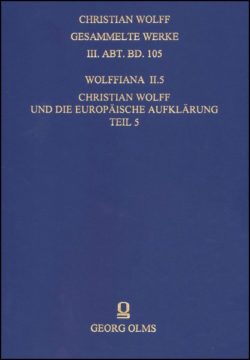Christian Wolff (1679–1754) gilt als der bedeutendste und wirkungsmächtigste Philosoph der Früh- und Hochaufklärung. Unter der Leitung der Philosophie und der sog. mathematischen Methode suchte er ein enzyklopädisches System der Wissenschaften auf dem Stand der Bildung seiner Zeit zu begründen. In der Mitte seines Jahrhunderts war Wolff zu einer europaweit gerühmten Autorität geworden. Noch von Kant als „Erfinder des Geistes der Gründlichkeit“ in Deutschland gerühmt, verblasste sein Ruhm indessen bald. Erst die von Jean Ecole und anderen besorgte große Ausgabe der Werke Wolffs hat zu einer Wiederentdeckung Wolffs und zur Neubelebung der internationalen Wolff-Forschung geführt.
***
Christian Wolff (1679–1754) was one of the most important and influential philosophers of the early and high Enlightenment. Using philosophy and what was known as the mathematical method he sought to establish an encyclopaedic system of knowledge on the basis of contemporary intellectual culture. In the middle of his century Wolff was renowned throughout Europe as an authority. Still celebrated by Kant as the “inventor of the spirit of thoroughness”, his reputation faded soon afterwards. It was only the publication of the major edition of Wolff ’s works prepared by Jean Ecole and others that led to the rediscovery of Wolff and a reinvigoration of international Wolff scholarship.
- Veröffentlicht am Donnerstag 9. Januar 2025 von Olms, Georg
- ISBN: 9783487133928
- 468 Seiten
- Genre: Aufklärung, Hardcover, Philosophie, Renaissance, Softcover
